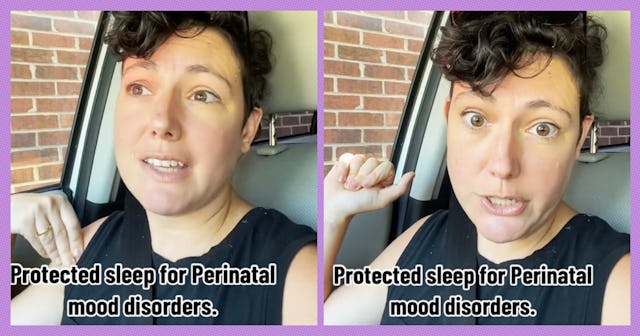Lactation Consultant Explains What “Protected Sleep” Is And Why All New Moms Need It
So many women don't know this!

We often hear about “safe sleep,” and there are several (valid!) safety protocols that are drilled into a new mom’s brain about how to keep your baby safe and secure while sleeping — guidelines like no blankets in the bassinet, no mesh liners, and always place a baby down on their back for sleep.
But what about stressing the importance of sleep for new moms? There is a concept known as protected sleep that not many new moms know about (or even experienced moms), and it should definitely be talked about more because protected sleep benefits can truly be a game changer for moms.
What is protected sleep?
Protected sleep is a term that refers to a person, in this case new moms, getting uninterrupted sleep. This means completely off-duty sleep with zero interruptions. No shocker here: sometimes new moms or pregnant women can find themselves a bit emotionally disregulated after having a new baby. And there’s enough new stuff going on at this time that having a big enough block of sleep helps a lot of things.
With protected sleep time, that rest is “protected” in a variety of ways by themselves and those around them.
Victoria Facelli, IBCLC, went viral on TikTok after explaining the phenomenon of protected sleep and why moms with mood disorders are in desperate need of the uninterrupted sleep.
“Protected sleep is a concept we use in the treatment of perinatal mood disorders, so including pregnancy and postpartum, where we consolidate four to six hours of sleep that's uninterrupted for a parent who is struggling with mood after they have a baby,” Facelli said.
Protected sleep vitals
In order for a new mom to actually see the benefits of protected sleep, there are certain aspects that must be instilled. Protected sleep means no interruptions and no worries about the baby because someone else from the village is there for her.
Facelli also recommends earplugs and white noise for ultimate protected sleep.
“Someone else is going to feed that baby, someone else was caring for them, and they know that baby is safe and you sleep uninterrupted four to six hours,” she continued.
In order to “protect” sleep time, a mom is recommend to put as much space and buffer between herself and baby as possible — obviously this is easier said than done especially in today’s postpartum world of non-existence villages.
In the fortunate case where friends, grandparents, and partners are participating members in the raising of a new baby, protected sleep can be possible and beneficial.
For those wondering how to help out a new mom, encouraging them to get some protected sleep could be the best gift of all. Even if that means prepping a meal, picking up their house for them, etc. something that will give them the time to take that protected sleep break.
“If you have a friend who just had a baby, this is an awesome way to help is to be the person that helps them get that protected sleep and then asking them how it went after,” Facelli said in a follow-up video.
Protected sleep research study
Some researchers believe that sleep might be an overlooked prescription for several postpartum disorders such as depression and anxiety.
A 2022 study suggested created a 4-step method to prescribing sleep for new moms. First, society and postpartum culture must “change the message” about motherhood, “so that women see self-care rather than self-sacrifice as the hallmark of a good mother.”
Next, women need to be more educated about sleep deprivation and the possible consequences. The study also suggests that moms need to “recruit help (to the extent possible)” to help with the baby, especially newborn night feedings because those are, “a job for more than one person.”
Lastly, moms need to be encouraged to find a more flexible approach to breastfeeding if they find themselves struggling with the constant demand as well as the sleep deprivation.
After Facelli’s video went viral, several moms commented on the video, stressing the importance of sleep and sharing how much sleep deprivation affected their postpartum experience.
“This was the only thing that helped me turn a corner. A friend/practitioner sat down with my husband and said ‘your wife is dying, she has to sleep,’” one user wrote.
Another wrote, “Some nights my husband and I do this for one another and it makes all the difference. We call it ‘taking the night shift’ we usually switch at 3 am.”
One mom wrote, “My mom did this for me right when I was on the verge of slipping into a serious bout of PPD, it was a god send.”
It shouldn’t be too much to ask your partner or your village for four hours of sleep without worry. Let’s normalize this and make it something we do for new moms as often as we offer to make them a meal or hold the baby for a bit.
This article was originally published on